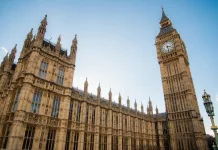The UK has shifted to tougher measures partly as a result of a document produced by the COVID-19 team at London’s Imperial College.
The modelling by Imperial College London has been heavily informed by the experience in Italy and is influencing decisions at the heart of government.
A strategy of just slowing the spread of the virus, but not trying to stop it, would have overwhelmed intensive care units. Its calculations predicted 260,000 deaths in the UK.
The government is set to unveil new financial plans to help the economy during the coronavirus outbreak.
Prime Minister Boris Johnson announced unprecedented peacetime measures and urged everyone to avoid unnecessary social contacts, to work from home where possible, and to stay away from pubs and restaurants.
The UK’s shift in strategy comes as Europe plans to ban all non-essential travel throughout the Schengen free-travel zone, as more countries close their borders.
Instead the plan is to drive down the number of cases to very low levels, which the models predict will limit deaths from coronavirus to the thousands or tens of thousands.
Though over 1,500 people have tested positive for the virus in the UK – the actual number of cases is estimated to be between 35,000 and 50,000, experts say.
People in at-risk groups will be asked within days to stay home for 12 weeks.
Under the guidance, people who should be “particularly stringent” in minimising their social contact are: people over the age of 70, other adults who would normally be advised to have the flu vaccine (such as those with chronic diseases) and pregnant women.
Key new measures announced
- Everyone should avoid gatherings with friends and family, as well as large gatherings and crowded places, such as pubs, clubs and theatres
- People should avoid non-essential travel and work from home if they can
- All “unnecessary” visits to friends and relatives in care homes should cease
- People should only use the NHS “where we really need to” – and can reduce the burden on workers by getting advice on the NHS website where possible
- By next weekend, those with the most serious health conditions must be “largely shielded from social contact for around 12 weeks”
- If one person in any household has a persistent cough or fever, everyone living there must stay at home for 14 days
- Those people should, if possible, avoid leaving the house “even to buy food or essentials” – but they may leave the house “for exercise and, in that case, at a safe distance from others”















